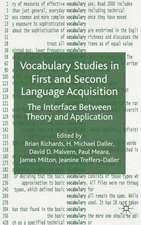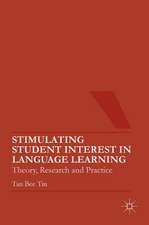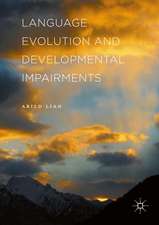Presuppositions and Cognitive Processes: Understanding the Information Taken for Granted: Palgrave Studies in Pragmatics, Language and Cognition
Autor Filippo Domaneschien Limba Engleză Hardback – 30 iul 2016
Din seria Palgrave Studies in Pragmatics, Language and Cognition
- 20%
 Preț: 755.73 lei
Preț: 755.73 lei - 15%
 Preț: 631.37 lei
Preț: 631.37 lei -
 Preț: 381.27 lei
Preț: 381.27 lei - 15%
 Preț: 630.74 lei
Preț: 630.74 lei -
 Preț: 381.27 lei
Preț: 381.27 lei -
 Preț: 384.10 lei
Preț: 384.10 lei -
 Preț: 379.93 lei
Preț: 379.93 lei -
 Preț: 386.95 lei
Preț: 386.95 lei -
 Preț: 389.76 lei
Preț: 389.76 lei - 15%
 Preț: 631.05 lei
Preț: 631.05 lei - 15%
 Preț: 630.09 lei
Preț: 630.09 lei -
 Preț: 379.01 lei
Preț: 379.01 lei -
 Preț: 380.34 lei
Preț: 380.34 lei - 15%
 Preț: 633.45 lei
Preț: 633.45 lei -
 Preț: 384.86 lei
Preț: 384.86 lei -
 Preț: 415.23 lei
Preț: 415.23 lei - 15%
 Preț: 690.08 lei
Preț: 690.08 lei -
 Preț: 445.80 lei
Preț: 445.80 lei - 18%
 Preț: 930.90 lei
Preț: 930.90 lei - 15%
 Preț: 632.17 lei
Preț: 632.17 lei -
 Preț: 381.09 lei
Preț: 381.09 lei -
 Preț: 387.90 lei
Preț: 387.90 lei -
 Preț: 386.95 lei
Preț: 386.95 lei - 15%
 Preț: 633.32 lei
Preț: 633.32 lei
Preț: 412.19 lei
Nou
Puncte Express: 618
Preț estimativ în valută:
78.88€ • 82.18$ • 65.59£
78.88€ • 82.18$ • 65.59£
Carte tipărită la comandă
Livrare economică 10-24 februarie 25
Preluare comenzi: 021 569.72.76
Specificații
ISBN-13: 9781137579416
ISBN-10: 1137579412
Pagini: 158
Ilustrații: XV, 164 p. 10 illus.
Dimensiuni: 148 x 210 x 16 mm
Greutate: 0.37 kg
Ediția:1st ed. 2016
Editura: Palgrave Macmillan UK
Colecția Palgrave Macmillan
Seria Palgrave Studies in Pragmatics, Language and Cognition
Locul publicării:London, United Kingdom
ISBN-10: 1137579412
Pagini: 158
Ilustrații: XV, 164 p. 10 illus.
Dimensiuni: 148 x 210 x 16 mm
Greutate: 0.37 kg
Ediția:1st ed. 2016
Editura: Palgrave Macmillan UK
Colecția Palgrave Macmillan
Seria Palgrave Studies in Pragmatics, Language and Cognition
Locul publicării:London, United Kingdom
Cuprins
Introduction.- Chapter 1: Experimental Pragmatics.- Chapter 2: Presuppositions.- Chapter 3: Mental States and Presuppositions. An Experiment.- Chapter 4: Processing Presupposition Triggers.- Chapter 5: Processing Conditional and Unconditional Presuppositions.- Chapter 6: The Cognitive Load Factor.- Chapter 7: Conclusions.
Notă biografică
Filippo Domaneschi is Lecturer and Researcher in Psychology of Language at the University of Genoa, Italy and he is director of the research project EXPRESS – Experimenting on presuppositions. He is author of various psycholinguistic papers in scientific journals, and he is author of Introduction to pragmatics (2014, tr. engl.), co-editor of What is said and what is not (2013) and editor of the special issue Presuppositions: philosophy, linguistics and psychology (2016).
Textul de pe ultima copertă
This book breaks new ground towards an understanding of the mental processes involved in presupposition, the comprehension of information taken for granted. Various psycholinguistic experiments are discussed to support the idea that involved in ordinary language comprehension are complex and demanding cognitive processes. The author demonstrates that these processes exist not only at the explicit level of an utterance but also at a deeper level of computing, where the background information taken for granted as already known and shared between interlocutors is processed. The author shows that experimental research can suggest new theoretical models for presupposition, thus this book will be of interest to researchers and students of psycholinguistics, the philosophy of language and experimental pragmatics.
Filippo Domaneschi is Lecturer and Researcher in Psychology of Language at the University of Genoa, Italy and he is director of the research project EXPRESS– Experimenting on presuppositions. He is author of various psycholinguistic papers in scientific journals, and he is author of Introduction to pragmatics (2014, tr. engl.), co-editor of What is said and what is not (2013) and editor of the special issuePresuppositions: philosophy, linguistics and psychology (2016).
Caracteristici
Demonstrates that experimental research can suggest new theoretical models for presupposition Posits that presupposition itself is a real, specific phenomenon, not to be reduced to other kinds of implicit meaning Investigates the cognitive processes involved in processing presuppositions





















